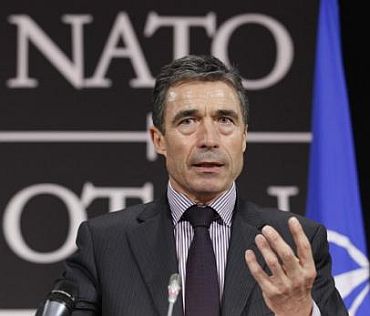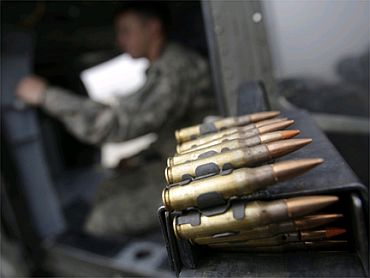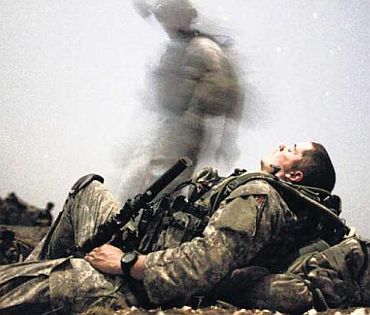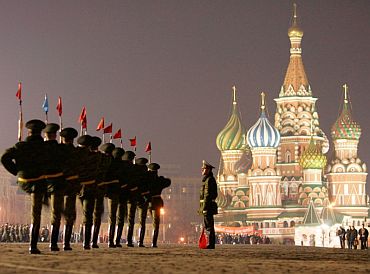Pallavi Aiyar in Brussels
Days after the North Atlantic Treaty Organization concluded a major summit in Lisbon intended to update its mission and methods to keep up with changing times, Nato Secretary General Anders Fogh Rasmussen called for stepped-up contacts with India.
In an exclusive interview with Business Standard, Rasmussen insisted that the military alliance's relations with close ally Pakistan would not be developed at the expense of India, while lamenting the fact that despite an array of shared interests, there was virtually no formal contact between Nato and New Delhi.
The secretary general identified three main arguments for a "stronger relationship" with India.
...
'It's time NATO stepped-up contacts with India'
To begin with, he reasoned that as a fast emerging economy, India had a stake in ensuring free access to trade routes, sea lanes and communications networks and consequently shared in Nato's global security interests.
Rasmussen pointed to counter piracy and cyber security as concrete examples, where the concerns of both entities overlapped in this context.
He added that both India and Nato shared the same foundational values of democracy. Finally, he pointed to the "crucial role" played by India in the Afghanistan region, saying that he believed India could "contribute to the development of Afghanistan and help bring stability in the region."
But at the same time, Rasmussen talked about the need for India and Pakistan to ease tensions, since it was Nato's view that a "positive engagement of Pakistan" was needed in Afghanistan for any final solution.
'It's time NATO stepped-up contacts with India'
When asked about India's concerns that Nato's ally Pakistan was in fact hand-in-glove with the Taliban and waiting to stake its claim on Afghanistan once Nato troops withdrew from the region, Rasmussen admitted that these were "legitimate concerns."
"But this is yet another argument in favour of having a concrete dialogue with India."
He said Nato's relationship with Pakistan "will not be developed at the expense of India," but asked, "how can we explain this to India without a dialogue?"
Rasmussen revealed that while he had met with the Indian ambassador to Belgium and the European Union, on "few occasions", his attempts at initiating deeper contacts with India had not met with much success as yet.
'It's time NATO stepped-up contacts with India'
At the Nato summit in Lisbon, the alliance had spelled out its plans for a phased exit strategy for Nato troops from Afghanistan starting next year and ending by 2014.
"We will not leave a security vacuum in the region that may lead to instability or terrorism," he said, clarifying that the 2014 deadline was a "goal" rather than a deadline.
"This (the planned withdrawal) is something else we'd like to discuss further with India," Rasmussen smiled.
Talking about the other main take away from the Lisbon summit, the "historic" new start to Russia-Nato relations, the secretary general once again brought in an Indian angle. In Lisbon, Nato and its former arch nemesis Russia agreed to bury the hatchet and stated that neither saw the other as a threat.
'It's time NATO stepped-up contacts with India'
They went further and agreed to initiate a joint feasibility study into the possibility of Moscow cooperating with the 28 members of Nato in setting up a ballistic missile defence shield over Europe, a project that Russia was opposed to in the past.
"I hope that the improved relationship with Russia will make it politically easier for India to engage with Nato," concluded Rasmussen.
"It's clear now that we are not a cold war Nato. Nato is engaging with the wider world and it's in India's interest to be an integrated part of that."







article